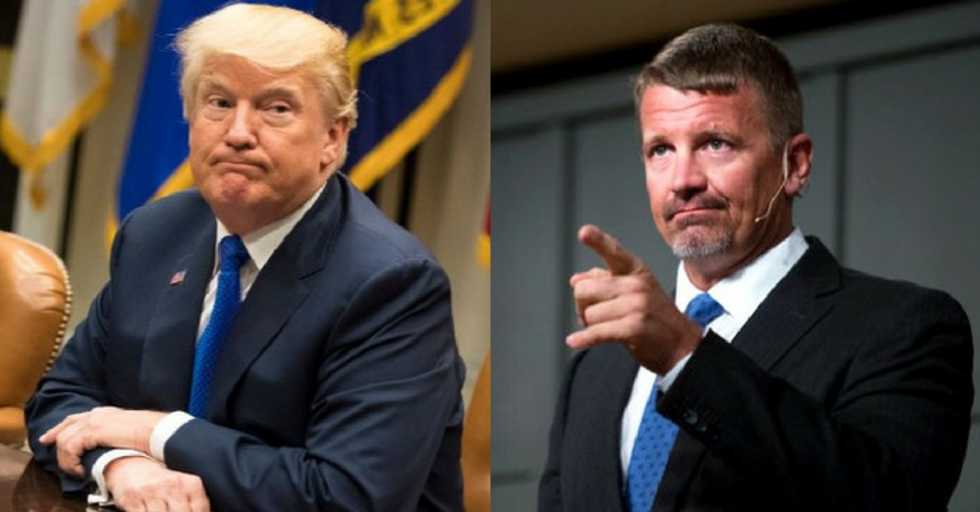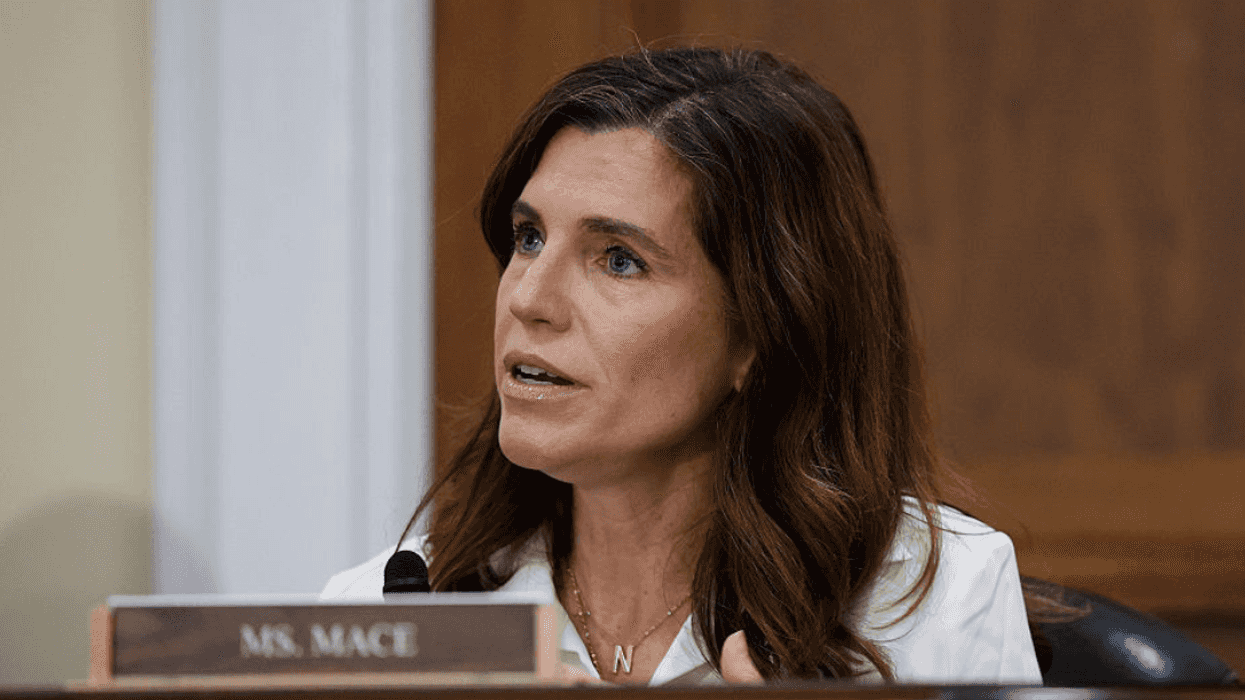Erik Prince—founder of the now rebranded Blackwater mercenary company—never held an official adviser role in the Trump campaign or the administration of President Donald Trump. But Prince donated $250,000 to pro-Trump causes during the campaign and also met with members of Trump's national security team during the transition.
Prince is also a person of interest in the Robert Mueller investigation into Russian interference in the 2016 presidential election and beyond. A friend of Steve Bannon, Prince reportedly also tried to set up another back channel for Trump administration officials to communicate with Russia—like the communication that led to the Trump Tower meeting with Donald Trump Jr. and Jared Kushner in attendance—just days before the inauguration.
Now, Prince looks to find a new role in the Trump administration. He wants Trump to bypass the Pentagon and hire his old company Blackwater—under the new name Academi—to once again work in Afghanistan.
And thanks to his efforts to ingratiate himself with the Trump family—including a meeting three months before the 2016 election with Trump Jr. and campaign adviser Stephen Miller and representatives of several middle eastern interests—Prince may have the President's ear.
After all, Prince's sister Betsy DeVos is a member of Trump's cabinet. DeVos—another large donor to Trump causes—serves as Secretary of Education despite having no experience with education.
Prince recently made media rounds touting his company. He also suggested his proposal is being reviewed by the President.
However a Trump administration spokesman from the National Security Council stated:
No such proposal from Erik Prince is under consideration. The president, like most Americans, would like to see more progress in Afghanistan. However, he also recognizes that withdrawing precipitously from Afghanistan would lead to the re-emergence of terrorist safe havens, putting American national security and lives in danger."
Prince claims his private mercenaries save money and lives. He wants Trump to hire him to run the Afghan War for the United States.
There's only one problem though. Last time Prince got a contract worth hundreds of millions under President George W. Bush, the opposite proved true. Prince's employees cost more money and routinely killed people.
Prince's former company name—Blackwater—may sound familiar. Congress investigated the company back in 2007 for misconduct for their roles in Iraq and Afghanistan. In August 2010, the company agreed to pay a $42 million fine to settle allegations of illegal arms dealing.
That settlement and fine concluded a U.S. State Department investigation begun in 2007. In August 2012, the company agreed to pay $7.5 million in fines to the US government to settle various other charges.
In his 2007 congressional testimony, Prince said his company lacked remedies to deal with the many flagrant employee abuses of power and thefts because they "can't flog" and "can't incarcerate" their personnel. When asked for financial information about Blackwater, Prince refused saying "we're a private company, and there's a key word there—private."
According to that same congressional hearing, Blackwater charged the United States government $1,222 per day per guard "equivalent to $445,000 per year or six times more than the cost of an equivalent U.S. soldier." But Prince claimed the figures, while accurate, failed to reflect the expertise provided by his mercenaries over any U.S. military personnel.
But as a result of the rampant abuses by his expert employees, the House of Representatives passed stricter penalties and increased jurisdiction under the Military Extraterritorial Jurisdiction Act in October 2007 leading to the prosecution of some military contractors. But only for incidents involving their attacks against United States citizens.
Many more abuses against citizens of Iraq, Afghanistan and other countries' armed forces aiding the United States efforts went unprosecuted and unpunished due to jurisdiction claims made by Blackwater. Prince claimed his employees as U.S. government contractors were exempt from local prosecution as well as that of governments other than the United States.
On January 30, 2009, the State Department informed Blackwater Worldwide it would not renew their contract in Iraq. Prince then went into a period of rebranding, changing his company name several times trying to distance himself from the abuses perpetrated by his employees in the hopes of someday gaining another lucrative government contract with the United States.
Prince's close ties to the United Arab Emirates and the Blackwater debacle, most notably in Iraq, should raise strong objections among administration officials and members of Congress. But will it?
People are rightfully concerned as these reactions show.
"It's a ridiculous idea. It would only make things worse, prolong the war and cause more deaths," a former senior official told NBC News. Brian Katulis, a senior fellow at the Center for American Progress raised issues of oversight and personal responsibility. He stated:
It makes an already murky position murkier. The [purported] cost savings is not worth the potential damage to oversight of U.S. national security."
Prince's prior excuse of 'there's nothing we can do' for his Blackwater employees certainly indicates accountability would be a serious issue.
People online voiced the same concerns as well as asking why anyone with Prince's track record is given serious consideration.
While White House Press Secretary Sarah Sanders fielded questions about Afghanistan, the White House offered no official statement regarding Erik Prince or his proposal as of Friday afternoon.















 Awkward Pena GIF by Luis Ricardo
Awkward Pena GIF by Luis Ricardo  Community Facebook GIF by Social Media Tools
Community Facebook GIF by Social Media Tools  Angry Good News GIF
Angry Good News GIF 
 Angry Cry Baby GIF by Maryanne Chisholm - MCArtist
Angry Cry Baby GIF by Maryanne Chisholm - MCArtist 
 @adriana.kms/TikTok
@adriana.kms/TikTok @mossmouse/TikTok
@mossmouse/TikTok @im.key05/TikTok
@im.key05/TikTok @biontrtwff101/TikTok
@biontrtwff101/TikTok @likebrifr/TikTok
@likebrifr/TikTok @itsashrashel/TikTok
@itsashrashel/TikTok @ur_not_natalie/TikTok
@ur_not_natalie/TikTok @rbaileyrobertson/TikTok
@rbaileyrobertson/TikTok @xo.promisenat20/TikTok
@xo.promisenat20/TikTok @weelittlelandonorris/TikTok
@weelittlelandonorris/TikTok @katiebullit/TikTok
@katiebullit/TikTok @rube59815/TikTok
@rube59815/TikTok
 u/Fit_Bowl_7313/Reddit
u/Fit_Bowl_7313/Reddit